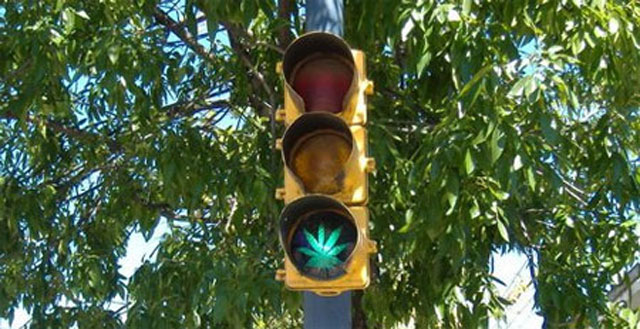Men in suits spilled into a courtyard, took out their pipes and joints, and burned one down. Lawyers and activists alike were enjoying a break from a three-day Aspen symposium hosted by the National Organization for the Reform of Marijuana Laws (NORML).
By Michael Komorn
Attorneys from across the country gathered at The Grant to discuss the rapidly changing legal status of marijuana.
(Related: Planet Green Trees Radio Episode 148-Bengazi/IRS/AP Emails)
“We have a consensus from experts that you can’t measure impairment from a blood test,” he added. “What we need to do is to provide police with better tools to measure impairment.”
A year ago this casual break from long days of hard work would have been illegal — perhaps that is why it smelled like celebration.
(Related: Los Angeles City Councilman Bill Rosendahl Thanks Medical Marijuana For Cancer’s Remission)
“The basis of our justice system is innocent until proven guilty,” said Armentano. “This law flips that, and puts the burden on the individual to prove that they are not impaired. I believe that is a dangerous road to go down.”
Since the passage of Amendment 64 by Colorado voters last November, the recreational use of marijuana has been legal for adults in Colorado. And with that significant change comes a host of questions about the legal and scientific framework governing marijuana use, with the latest being the evolving science of cannabis intoxication and stoned driving.
Deputy director of NORML, Paul Armentano, painted a picture of Colorado’s new stoned driving statute, signed into law by Gov. John Hickenlooper on Tuesday. The law has established a legal limit of five nanograms of THC — the psychoactive chemical in pot — per milliliter of blood for cannabis intoxication.
(Related: Federal Government Reports Marijuana Effective in Combatting Certain Cancers)
If you are caught driving with blood concentrations that exceed that limit you could be charged with Driving Under the Influence (DUI), a serious crimes that is accompanied by possible jail time, fines and a suspension of driving privileges.
Armentano told the assembled lawyers that measuring the amount of active marijuana in a driver’s system will not show whether or not they’re impaired.
“When I talk to policy makers on this issue, they want to get impaired drivers off the road, and yet blood tests are not impairment tests,” said Armentano, a nationally recognized expert on the science of marijuana intoxication and the evolving status of the nation’s drugged driving laws.
“We have a consensus from experts that you can’t measure impairment from a blood test,” he added. “What we need to do is to provide police with better tools to measure impairment.”
(Related: The Puff, Puff and Pass of Colorado’s Recreational Marijuana Laws)
Under Colorado’s law, a person charged with a marijuana DUI would be permitted to present evidence showing that while they may have had pot in their system, they weren’t really impaired.
“The basis of our justice system is innocent until proven guilty,” said Armentano. “This law flips that, and puts the burden on the individual to prove that they are not impaired. I believe that is a dangerous road to go down.”
The provision allowing drivers to challenge charges of impairment is evidence of the rapid evolution of cannabis science. It remains unclear as to the amount of marijuana someone has to consume before their driving skills suffer, or whether high levels of THC have correspondence with impairment.
Armentano provided a chart suggesting that THC levels in the blood of a pot smoker peak almost instantly after smoking. Peak impairment, by contrast, occurs anywhere between 10 and 60 minutes after a toke.
“That means that people are most likely to be under the influence of cannabis as their THC levels are dropping rapidly,” he said.
Research indicates that stoned drives may brake for stoplights more slowly than sober ones, and weave and show signs of decreased peripheral vision. However, Armentano argues that some studies also show that stoned drivers can be so paranoid that they end up driving more conservatively.
(Read more: Cannabis Science Publishes List of Over 800 Peer-Reviewed Cannabis and Cancer Scientific References)
“Cannabis users tend to over-estimate times, subjects seem to be aware of their impairment and to be increasingly self critical,” he said.
If you or someone you know is facing charges as a result of Medical Marijuana prescribed to you as a Medical Marijuana patient under the Michigan Medical Marijuana Act, contact Komorn Law and ensure your rights are protected.
Michael Komorn is recognized as a leading expert on the Michigan Medical Marihuana Act. He is the President of the Michigan Medical Marijuana Association (MMMA), a nonprofit patient advocacy group with over 26,000 members, which advocates for medical marijuana patients, and caregiver rights. Michael is also the host of Planet Green Trees Radio, a marijuana reform based show, which is broadcast every Thursday night 8-10 pm EST. Follow Komorn on Twitter.
Read more: http://www.aspendailynews.com/section/home/158148











